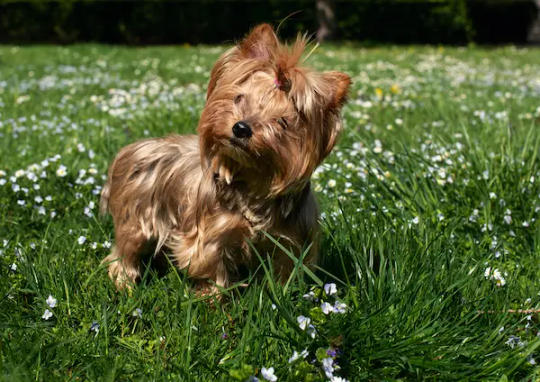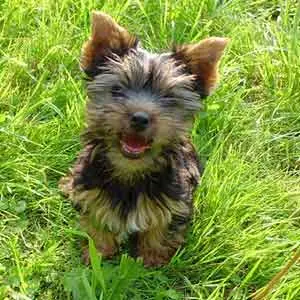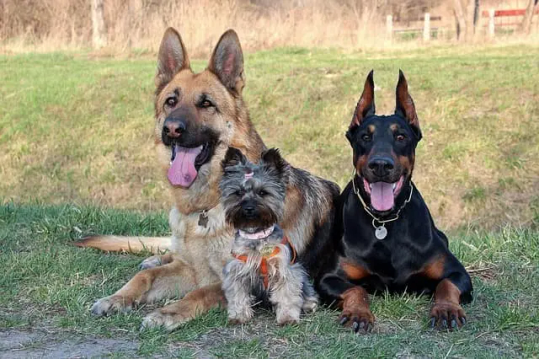#doyorkiesshed
Text
Do Yorkies Shed? Are Yorkies Hypoallergenic? – The Factual Guide

Yorkshire Terriers, affectionately known as Yorkies, are a popular dog breed often admired for their small size and elegant appearance. Many potential dog owners wonder if Yorkies shed and whether they are a hypoallergenic breed. The good news is that Yorkies do not shed to the same extent as many furrier breeds due to their long, silky coat. This unique coat is one of the reasons why Yorkies are considered a more hypoallergenic option for individuals with allergies.
While the coat of a Yorkie is more similar to human hair than fur, it is not the hair itself that typically causes allergic reactions. Instead, it's the dead skin, or dander, shed with the hair. Yorkies release significantly less dander than other breeds, making them a better choice for allergy sufferers. Additionally, the proper grooming and care of a Yorkie is crucial for maintaining its hypoallergenic qualities.
Key Takeaways
- Yorkies have a long, silky coat that sheds less than other dog breeds, making them a more hypoallergenic option.
- Allergic reactions are usually caused by dander, not hair, and Yorkies release significantly less dander.
- Regular grooming and care are essential for maintaining a Yorkie's hypoallergenic qualities.
Understanding Yorkies and Shedding
PlayUnderstanding Yorkshire Terrier Shedding and Hypoallergenicity
Are Yorkies Hypoallergenic?
Yorkshire Terriers, commonly known as Yorkies, are a popular breed among dog lovers. With their small size, lively personalities, and adorable appearance, it's easy to see why they catch people's attention. One question many potential owners may have is whether or not Yorkies shed. In this section, we will discuss the shedding habits of these little dogs and explore their hypoallergenic nature.

Yorkie sitting in the grass
In a word, yes, Yorkies do shed, but not to the same degree as furrier dogs. To understand their shedding habits, we need to consider their coat. Most dog breeds have a double coat, which consists of a thicker, coarser outer coat and a softer, finer inner layer. This double-coat system helps protect the dog from harsh weather conditions. However, Yorkies have a single coat, which consists of fine, silky hair that closely resembles human hair.
This single coat is one reason why Yorkies can be classified as a hypoallergenic breed. Hypoallergenic dogs produce less dander and are less likely to cause an allergic reaction, as dander is the primary source of allergens. Dander is essentially the dead skin cells that are shed alongside dog hair. Yorkies do produce dander, but they rarely have excessive shedding due to their single coat, making them suitable for people with allergies.
Yorkies' shedding cycle is different from dogs with double coats. Instead of shedding hair in large quantities during specific periods, they lose hair in a more continuous manner. Hair loss occurs as part of the natural hair growth cycle, which consists of shedding old, dead hair and regrowing new strands. This cycle is influenced by factors like genetics, hormones, and environmental conditions.
To minimize shedding, proper grooming is essential for Yorkies. Regular brushing can help remove loose hair and dead skin, making it less likely for these particles to end up on your furniture or clothes. Additionally, grooming should prevent their fine hair from becoming tangled or matted, reducing the chances of further hair loss.
In summary, while Yorkies do shed, their single coat and unique shedding cycle make them a suitable option for individuals with allergies. By maintaining proper grooming and care, Yorkies can continue to be a loving and friendly companion for years to come.
Characteristics of A Hypoallergenic Dog Breed

When it comes to hypoallergenic dogs, there are certain traits and characteristics that make them uniquely suitable for people with allergies. One of the primary factors is the amount of allergens found in a dog's coat, which mainly come from proteins in their dander, saliva, and urine. Hypoallergenic dog breeds are known to produce fewer allergens, thus reducing the risk of triggering allergic reactions.
Popular hypoallergenic dog breeds include the Bichon Frise, Poodle, and Maltese. These breeds are often small in size, which can further minimize the allergens spread in the environment. Apart from size, the temperament and intelligence of these breeds make them excellent companions for allergy sufferers.
A key factor that contributes to a dog being hypoallergenic is the type of coat they have. Many hypoallergenic breeds have double coats that don't shed as much as other breeds. This characteristic helps in trapping the allergens within their fur, preventing them from becoming airborne. Regular grooming and maintenance of their coats ensure that the allergens remain under control.
In addition to the coat type, hypoallergenic dog breeds tend to have fewer issues with parasites, which can also be a source of allergens. A well-cared-for hypoallergenic dog will have reduced chances of contracting parasites, thus making them a safer option for those with allergies.
However, it's essential to remember that no dog breed is entirely allergen-free. Hypoallergenic just means that these breeds produce fewer allergens, decreasing the likelihood of causing an allergic reaction. Each individual's response to a specific dog breed may vary, and it's crucial to spend time with the breed of interest before committing to adoption or purchase.
In conclusion, hypoallergenic dog breeds offer a better chance for allergy sufferers to enjoy the companionship of a furry friend. By understanding the characteristics that make a dog hypoallergenic, such as coat type, size, temperament, and grooming requirements, we can make an informed decision when choosing the best breed for our needs.
Grooming and Care Requirements for Yorkies
Caring for a Yorkshire Terrier requires regular grooming to maintain its silky coat and overall health. We recommend brushing their coat daily using a pin brush to avoid matting. Matting can cause discomfort and even lead to skin issues like redness, irritation, and infections. Daily brushing can help keep their coat shiny and tangle-free.
Bathing your Yorkie should be done every three to four weeks to keep their skin clean and healthy. Be mindful of the water temperature, as harsh heat can damage their coat and cause stress to your dog. Choose a mild dog shampoo to ensure gentleness on their skin, and check for fleas during the process.
Nutrition plays a crucial role in maintaining a healthy coat. Yorkies require balanced, high-quality food to maintain their low-shedding nature and reduce shedding-related issues. Providing proper nutrition can also help in preventing diseases, illness, and stress that can affect their coat's health.

Yorkie sitting with German Shepherd and Doberman
Regular grooming visits are essential for Yorkies, especially if you want to maintain a specific style for your dog, such as the popular puppy cut. A professional groomer has the experience and grooming tools to provide the best care for your Yorkie.
Lastly, it's crucial to monitor your Yorkie's overall health, as illnesses and stress can sometimes manifest through coat problems and excessive shedding. Regular vet check-ups help prevent and detect such issues early on, ensuring the well-being of your lovely companion.
In conclusion, while Yorkies are considered low-shedding and relatively hypoallergenic, proper grooming and care are essential to maintain their attractive, silky coat and general health. With daily brushing, monthly bathing, proper nutrition, and regular vet visits, your Yorkie will continue to shine both inside and out.
Allergy Management for Yorkie Owners
As Yorkie owners or prospective owners, we understand that it's crucial to manage allergies effectively, especially for those who suffer from dog allergies. While Yorkies are considered hypoallergenic, they still produce allergens such as dander, saliva, and urine. Let's explore some useful tips and best practices in allergy management for Yorkie owners.

We believe that maintaining cleanliness is essential for reducing exposure to allergens. Regular grooming of our Yorkies, including brushing and washing, can help minimize dandruff and shedding. It's also important to keep our living spaces clean and tidy. Vacuuming carpets, wiping surfaces, and laundering pet bedding regularly are all practical steps we can take to reduce allergen accumulation.
Investing in a HEPA air purifier can significantly improve the air quality in our homes. These air purifiers are designed to remove particles as small as 0.3 microns, which includes pet dander and other allergens. Plus, choosing a portable air purifier allows us to place it in any area of our home, particularly the bedroom, where we might experience allergy symptoms such as sneezing, watery eyes, or a runny nose.
When it comes to managing pet allergies, we also need to be mindful of our own hygiene. Washing our hands after petting our Yorkies and avoiding touching our face can help minimize exposure to allergens. Additionally, it's a good idea to establish some pet-free zones in our home, especially bedrooms, to create a safe space for allergy sufferers.
In conclusion, having a Yorkie as a pet, even if we or someone in our household has allergies, is possible. By implementing these allergy management strategies and maintaining a clean environment, we can effectively minimize health issues related to pet allergens.
Read the full article
#areyorkieshypoallergenic#dobichonyorkiesshed#dobieweryorkiesshed#domalteseyorkiesshed#dominiyorkiesshed#dopartiyorkiesshed#doteacupyorkiesshed#doteacupyorkiesshedalot#doyorkiesshed#doyorkiesshedalotofhair#doyorkiesshedawintercoat#doyorkiesshedbad#doyorkiessheddander#doyorkiesshedinthesummer#doyorkiesshedinthewinter#doyorkiesshedtheirpuppycoat#doyorkiesshedtheirpuppyhair#doesteacupyorkiesshed#doesyorkiesshed#howoftendoyorkiesshed
0 notes
Text
Yorkshire Terrier Facts: Essential Information for Pet Owners

Yorkshire Terriers, affectionately known as Yorkies, are one of the most popular toy dog breeds. With their small size, unique appearance, and spirited nature, they make excellent pets and companions. Yorkies were originally bred to work as ratters in mines and mills, which contributed to their feisty temperament and fearless disposition.
These tiny dogs boast long, silky coats that come in various colors like black and gold, black and tan, blue and gold, or blue and tan. Standing at about 7 to 8 inches tall and weighing no more than 7 pounds, Yorkies have certainly made a name for themselves with their charming qualities. Despite their petite size, they are known for their energetic nature and require proper care and grooming to keep them looking and feeling their best.
Yorkshire Terrier Facts
Key Takeaways
- Yorkshire Terriers are small but feisty dogs with a rich history as ratters in mines and mills.
- Yorkies have distinctive long, silky coats and require proper grooming to maintain their appearance.
- These energetic dogs make excellent companions and thrive with proper care, training, and socialization.
History
The Yorkshire Terrier, commonly referred to as Yorkies, has a rich history that dates back to the mid-1800s in England. The breed was developed in the English counties of Yorkshire and Lancashire, mainly by Scottish weavers who migrated there during this period. Originally, Yorkies were bred for their abilities as ratters in mines and mills, helping to control the rodent population in such settings (source).
During the Victorian era, the Yorkshire Terrier gained popularity as a fashionable companion dog, known for its small size and distinctive coat. The breed's intelligence and playful nature also made it a beloved pet in households of the time. The impact of the Scottish weavers' migration to England and the breed's evolution as a result of this relocation allowed the Yorkie to display its unique combination of characteristics, making it a sought-after breed (source).
Not only a domestic breed, Yorkshire Terriers also have a role in history as brave and loyal war heroes. One such notable Yorkie was Smoky, a World War II hero who assisted in both combat and life-saving missions. Smoky's intelligence and small frame enabled her to accomplish tasks that larger dogs could not perform, and her devotion to her handler's wellbeing was instrumental in saving the lives of several soldiers (source).
Breed Characteristics
The Yorkshire Terrier, commonly known as a Yorkie, is a small toy dog breed, native to England. It is characterized by a long, silky coat that's often black and tan. With a maximum weight of 7 pounds, Yorkies fall under the category of small-breed dogs, making them an excellent choice for those seeking a more compact canine companion.
Despite their small size, Yorkshire Terriers are known to have tenacious but affectionate personalities. Their temperament is typically a blend of stubbornness and intelligence, which makes them captivating companions and loyal protectors. Interestingly, these small dogs are often considered excellent watchdogs, as they are very vocal and protective of their family.
When it comes to physical traits, Yorkshire Terriers have a distinct appearance, marked by their long silky coats and upright ears. In terms of physical activity, Yorkies are a very energetic breed and require less than 20 minutes of exercise per day. They have a natural agility, making them apt for various dog sports and activities.
In addition to their temperament, Yorkshire Terriers are known for their compatibility as family dogs. While they may not be the best choice for families with very young children, they can adapt well to older children and adults who understand how to handle a small, sometimes stubborn, dog with care and respect.
Overall, the Yorkshire Terrier is a unique blend of size, personality, and energy that makes it a desirable breed for many dog lovers. With proper care and attention, Yorkies can thrive as cherished family members and devoted companions.
Physical Appearance
Yorkshire Terriers, commonly referred to as Yorkies, are small and compact dogs that have a distinctive and elegant appearance. Their coat is one of their most notable features, as it is long, silky, and fine. The texture of their fur is straight, with minimal waviness, giving them a refined aesthetic. This stunning, floor-length coat often cascades down their body, making them truly stand out from other dog breeds.
Yorkies have a unique coat coloration that sets them apart. While they may have minor variations, the primary colors found in their coat are a combination of black and tan, blue and gold, or blue and tan. These color combinations give the Yorkshire Terrier an unmistakable appearance. Yorkies do not have an undercoat, which means their fur is less thick, making them more prone to temperature fluctuations.
The breed has a few more distinguishing characteristics beyond its coat. For example, Yorkies have a long back and upright ears, giving them an alert and curious appearance. Their eyes are often bright and sparkling, reflecting their intelligent and lively nature. Yorkshire Terriers typically stand 7 to 8 inches in height and weigh around 7 pounds, making them an ideal size to adapt to various living situations.
It's worth noting that tail docking is a common practice among Yorkshire Terriers, which involves removing a portion of their tail at a young age. This is often done for cosmetic reasons, as it is believed to give them a more polished and refined appearance.
In summary, the Yorkshire Terrier's physical appearance is characterized by its long and silky coat, which is usually black and tan, blue and gold, or blue and tan. The breed's unique look, combined with its energetic and spirited nature, has made them one of the most beloved toy dog breeds around the world.
Grooming and Care
Yorkshire Terriers, or Yorkies, are well-known for their hypoallergenic long and silky coats. This distinctive feature makes them an attractive choice for many pet owners. However, it also means that they require special attention and grooming to keep their coats healthy and manageable.
Frequent brushing is essential for Yorkies, as their long hair is prone to knots and tangles. It's recommended to brush their coat daily using a slicker brush or a pin brush to carefully remove any mats and keep their fur smooth. Regular trims will also help in maintaining their coat's length and prevent it from becoming unmanageable. It's important to pay attention to areas around the ears, legs, and chest, as these are particularly prone to matting.

In addition to coat care, it's vital to keep their ears clean and trimmed, and their nails properly clipped. These tasks should be done on a regular basis to ensure the overall health and well-being of the dog. Bathing should be done as needed, but not too frequently to avoid stripping the natural oils from their coat.
Yorkies tend to be a high-energy breed that thrives on play and exercise. While they are not excessive barkers, they are known to have a strong tendency to bark, particularly when they want attention or feel threatened. To curb this behavior, it's essential to establish a consistent routine and keep them engaged with proper training, socialization, and mental stimulation.
To summarize, taking care of a Yorkshire Terrier calls for consistent and thorough grooming practices, including daily brushing, regular trims, and proper ear and nail care. Moreover, maintaining their energy levels through play and exercise, along with proper training to minimize barking, will ensure a happy and healthy Yorkie.
Personality and Behavior
The Yorkshire Terrier, or Yorkie, is known for its confident and courageous personality. This small breed packs a big punch when it comes to their temperament. They are highly affectionate with their families and are known to be loyal companions. Yorkies are quite energetic, which means they require daily exercise and mental stimulation to keep them happy and healthy.
Yorkies are often referred to as "lap dogs" due to their small size and love for cuddling with their owners. However, don't be fooled by their appearance; they have a strong and bold demeanor that stems from their original purpose of hunting small vermin. This fearless attitude is part of what makes them such endearing pets.
When it comes to interaction with other animals, Yorkshire Terriers may exhibit overprotective behavior. Their innate courage and confidence can lead to them standing up to larger dogs when they perceive a threat to themselves or their family. Much like the Dandie Dinmont Terrier, Yorkies can display a tenacious character when faced with challenges.
In summary, the Yorkshire Terrier possesses an energetic, affectionate, and loyal personality. Their confidence and courage make them excellent watchdogs and devoted companions. Despite their small size, they are not simply lap dogs; they have a bold presence that makes them stand out among other breeds.
Training and Socialization
Yorkshire Terriers, also known as Yorkies, are small dogs with big personalities. Training and socialization play a crucial role in shaping their behavior and ensuring they grow up to be well-rounded and confident pets.
Yorkies are intelligent and eager to learn, making them generally easy to train. The American Kennel Club (AKC) recommends starting their training early, ideally during puppyhood.
It's essential to use positive reinforcement techniques with Yorkies, like praise and treats to motivate them during training sessions. Consistency and patience will also help them build strong bonds with their owners and quickly learn the desired behaviors.
To challenge their intelligence and encourage the development of various skills, consider engaging Yorkies in dog sports such as agility and obedience. These activities provide mental and physical stimulation while reinforcing their training.

Socialization is another vital aspect of raising a well-adjusted Yorkie. Early socialization helps them become accustomed to various environments, people, and animals. According to The Spruce Pets, some methods of socializing your Yorkie include regular walks in different locations, visits to dog parks, play dates with friends and their dogs, and enrolling them in dog daycare.
Incorporating training and socialization into a Yorkie's routine ensures they grow up to be confident, obedient, and friendly companions.
Health Issues
Yorkshire Terriers, while generally healthy, can be susceptible to certain health problems. One common issue they could face is dental disease, which frequently affects small dog breeds like the Yorkshire Terrier as they age source. Regular dental care is essential for maintaining good oral health.
Another health concern is hypoglycemia, which is a condition where the blood sugar level drops dangerously low. Symptoms may include tremors and seizures source. If hypoglycemia is suspected, it is important to consult a veterinarian immediately.
Yorkies may also experience patellar luxation, where the kneecap becomes dislocated from its normal position source. This can lead to arthritis and pain in the affected joints. If your dog shows signs of limping or discomfort, it's essential to have them evaluated by a veterinarian to determine the cause and the appropriate course of treatment.
Liver shunts, or portosystemic shunts, are another potential concern as they can cause toxins to bypass the liver, leading to a buildup in the bloodstream. This could result in disorientation, vomiting, and other behavioral changes source. Surgery or medication may be required for the treatment of liver shunts.
Yorkshire Terriers may also be prone to heart defects, such as patent ductus arteriosus, and degenerative diseases like Legg-Calvé-Perthes disease source. These conditions typically require professional diagnosis and management to ensure the best possible quality of life for the affected dog.
The life span of a Yorkshire Terrier usually ranges from 12 to 16 years, although some dogs may live longer with proper care and nutrition source. Providing a balanced diet, regular exercise, and routine health check-ups with a veterinarian can help reduce the risk of these health issues and ensure your Yorkie lives a long and healthy life.
Living Conditions
Yorkshire Terriers are popular apartment dogs due to their small size and adaptability. They are known for being affectionate and friendly lapdogs, making them excellent companions for people living in limited spaces. As members of the toy dog category, Yorkshire Terriers are well-suited for indoor living and resultantly don't need extensive outdoor space.
That being said, Yorkshire Terriers still have a very energetic disposition, and their exercise needs should not be overlooked. Daily walks and playtime are essential to meet their activity requirements, typically totaling less than 20 minutes per day. Providing them with toys that engage their curiosity and intelligence will also help maintain their mental well-being.
As for weather conditions, Yorkshire Terriers have a long, silky coat that is hypoallergenic but does not provide them with the necessary insulation in cold weather. Extra care should be taken when temperatures drop, as their tolerance of cold is relatively low. In these cases, providing your Yorkie with warm clothing and limiting their exposure to the cold will help keep them comfortable sleeping well, and safe.
In summary, Yorkshire Terriers can thrive in various living situations, including apartments and small homes, as long as their exercise and mental stimulation needs are met. Given their energetic nature and affectionate demeanor, Yorkies make excellent companions for those who can provide a loving and attentive environment. Cold weather does require some additional consideration, but with proper care, your Yorkie will remain comfortable in all conditions.
Famous Yorkshire Terriers
Yorkshire Terriers, also known as Yorkies, have made their presence known throughout history with remarkable stories and accomplishments. One famous Yorkshire Terrier was Smoky, a war hero in World War II who saved the lives of soldiers by dragging a communications cable through a narrow drainage pipe. Besides Smoky's bravery, she was also known as the first therapy dog, offering comfort and companionship to soldiers in the field.
Another notable Yorkshire Terrier was Pasha, owned by President Richard Nixon. Pasha accompanied the president and his family in the White House, symbolizing the breed's popularity and prestigious status. However, it is essential to note that Pasha was not a Yorkshire Terrier but rather a Cairn Terrier, often mistaken for the former due to their similar small size and terrier features.
Famous Yorkies have also graced pop culture through iconic movies and television shows. For instance, the character Toto from The Wizard of Oz is often associated with Yorkshire Terriers due to their resemblance; however, Toto was, in fact, a Cairn Terrier.
In the world of dog shows, Tomboy Toy, a Yorkshire Terrier, won the Crufts dog show in the United Kingdom in 1932, further cementing the breed's reputation for charm and elegance. This victory showcases the Yorkie's accepted role in both the family home and competitive dog show arena.
Read the full article
0 notes